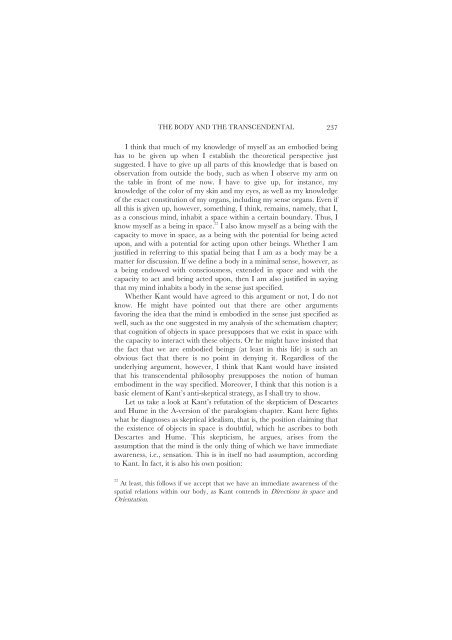BODY AND PRACTICE IN KANT
BODY AND PRACTICE IN KANT
BODY AND PRACTICE IN KANT
Create successful ePaper yourself
Turn your PDF publications into a flip-book with our unique Google optimized e-Paper software.
THE <strong>BODY</strong> <strong>AND</strong> THE TRANSCENDENTAL 237<br />
I think that much of my knowledge of myself as an embodied being<br />
has to be given up when I establish the theoretical perspective just<br />
suggested. I have to give up all parts of this knowledge that is based on<br />
observation from outside the body, such as when I observe my arm on<br />
the table in front of me now. I have to give up, for instance, my<br />
knowledge of the color of my skin and my eyes, as well as my knowledge<br />
of the exact constitution of my organs, including my sense organs. Even if<br />
all this is given up, however, something, I think, remains, namely, that I,<br />
as a conscious mind, inhabit a space within a certain boundary. Thus, I<br />
know myself as a being in space. 22 I also know myself as a being with the<br />
capacity to move in space, as a being with the potential for being acted<br />
upon, and with a potential for acting upon other beings. Whether I am<br />
justified in referring to this spatial being that I am as a body may be a<br />
matter for discussion. If we define a body in a minimal sense, however, as<br />
a being endowed with consciousness, extended in space and with the<br />
capacity to act and being acted upon, then I am also justified in saying<br />
that my mind inhabits a body in the sense just specified.<br />
Whether Kant would have agreed to this argument or not, I do not<br />
know. He might have pointed out that there are other arguments<br />
favoring the idea that the mind is embodied in the sense just specified as<br />
well, such as the one suggested in my analysis of the schematism chapter;<br />
that cognition of objects in space presupposes that we exist in space with<br />
the capacity to interact with these objects. Or he might have insisted that<br />
the fact that we are embodied beings (at least in this life) is such an<br />
obvious fact that there is no point in denying it. Regardless of the<br />
underlying argument, however, I think that Kant would have insisted<br />
that his transcendental philosophy presupposes the notion of human<br />
embodiment in the way specified. Moreover, I think that this notion is a<br />
basic element of Kant’s anti-skeptical strategy, as I shall try to show.<br />
Let us take a look at Kant’s refutation of the skepticism of Descartes<br />
and Hume in the A-version of the paralogism chapter. Kant here fights<br />
what he diagnoses as skeptical idealism, that is, the position claiming that<br />
the existence of objects in space is doubtful, which he ascribes to both<br />
Descartes and Hume. This skepticism, he argues, arises from the<br />
assumption that the mind is the only thing of which we have immediate<br />
awareness, i.e., sensation. This is in itself no bad assumption, according<br />
to Kant. In fact, it is also his own position:<br />
22 At least, this follows if we accept that we have an immediate awareness of the<br />
spatial relations within our body, as Kant contends in Directions in space and<br />
Orientation.
















